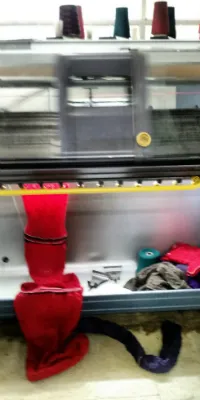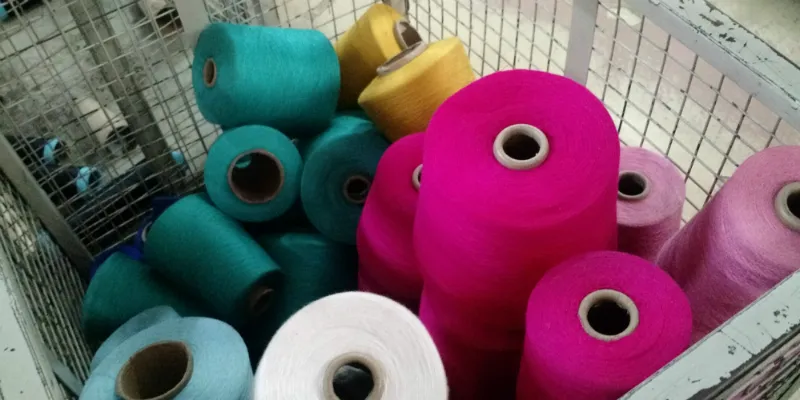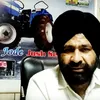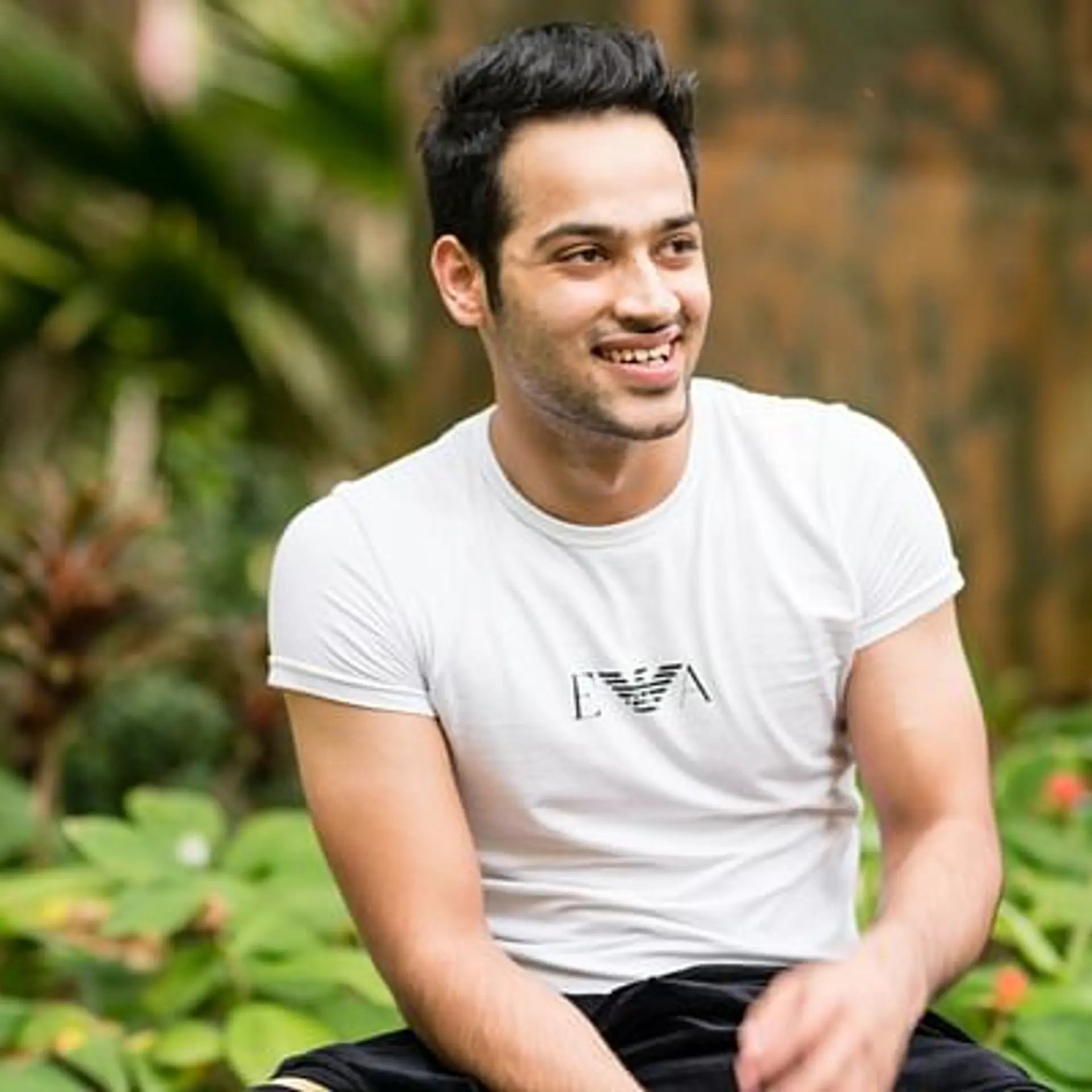Here’s how Akash Bansal built Rage Knitwear from nothing to a Rs 60Cr business from Ludhiana
Akash Bansal never took no for an answer. This attitude opened many doors for the Founder of Rage Knitwear, which clocks Rs 60 crore turnover. Read the businessman’s journey from Ludhiana to Germany, and back to India to create a success story in the Indian textile industry.
The $250 billion textile industry in India has many heroes. There are big brands from Bombay Dyeing, Raymond, Grasim Industries, and more, which dominate the textile market.
However, there are thousands of mid-sized and smaller brands jostling for consumer attention in this highly competitive market, which, after agriculture, is the second-largest employment generating sector in India.

Akash Bansal. (Photo by author)
From hand-spun and hand-woven segments to the more capital-intensive power looms and hosiery and knitting segments, the textile industry covers a wide spectrum. And thanks to Flipkart, Myntra, Jabong, and Amazon’s focus on fashion, as a consumer you do not have to travel far to find this variety.
Ludhiana’s rage
The SMBStory team, however, travelled to Ludhiana to capture the stories of some of these brands. After Tirupur, Ludhiana is the hub for knitwear, hosiery, and woollen garments, contributing nearly 95 percent of the country’s woollen knitwear.
Tucked in one of the bylanes of the industrial Focal Point area just outside the city, stands a nondescript, one-storey building that houses the office and factory of Rage Knitwear.
The brand has 25 exclusive brand outlets (EBOs) and over 500 multi-brand outlets (MBOs) and departmental stores throughout India. Its merchandise includes cardigans, knitted tops, woven blouses, dresses, tunics, jumpers, capes, ponchos, etc for women.
Rage has had Bollywood celebrities like Priyanka Chopra, Katrina Kaif, Diya Mirza, Sameera Reddy, Riya Sen, Mallika Sherawat, and Jacqueline Fernandez as its brand ambassadors.

A model displays Rage merchandise.
In fact, there’s an interesting story of how 54-year-old Akash Bansal, the Founder of Rage, got these actors to model for his brand when they were struggling to make a breakthrough in the film industry. But let’s leave the brand’s marketing strategy for later in the story.
The story behind how Akash Bansal built Rage from nothing to a garment business with a turnover of Rs 60 crore is an even more interesting one.
Akash wanted to be a fashion designer but could not attend the prestigious Fashion Institute of Technology, New York, despite having cleared the exam as he did not have enough money to secure the admission. “I come from a humble background. My father was working with my uncle at his textile factory and he was unable to finance my higher education abroad,” Akash tells me.
So he went back to his next love, which was electronics. After studying in Bangalore he joined BPL Sanyo. “But I had to return to Ludhiana six months later as my father wanted me to help him in his business,” Akash adds.
Though he returned home, he was not satisfied with being just a cog in someone else’s business. “I could not work in that system. There were no proper processes in place and things were managed ad hoc,” he reflects, adding, “I told my dad I can't work in this system. There would be clashes. I told him I wanted to start something of my own.”
But there was no capital that his father or his uncle could spare for him.
Hustle is as hustle does
Akash had heard about Stoll, the German-based global leader in flat knitting-machine technology. He decided to attend the year-long free workshop that the company offered at that time to train industry people who were the company’s potential clients to buy the machines.
The Stoll machine - it cost upwards of Rs 50 lakh in 1990 - was yet to be imported to India.
As the story of Akash’s life had been so far, he did not have the money to attend the year-long workshop. “I wrote to the company offering to be their India person and undergoing the training. The area manager who got back to me wondered why they should train me since they were not selling in India. ‘You cannot buy any machines from us,’ he told me,” says Akash, recalling the initial years of hustle and struggle.

Knitwear samples on display at Rage factory in Ludhiana (Photo by author)
“I told him, ‘if I get trained, the company will have a person in India and I will provide a free service to anyone for two years after you train me. So whenever you decide to sell your machines here, I will be available to you. You have to explore India as a market. It is a huge one’,” Akash adds. This was in 1993.
The free training included free stay and food which worked out well for Akash.
“Just imagine, out of Ludhiana, I now had access to the best of knitwear designers of the world right from people from top brands like Versace. I made friends with all of them,” Akash tells me.
Today, hustle is what startup founders thrive on. But in those days, had it not been for Akash’s hustle, he would not have been able to set up Rage.
Once his year-long training was over, Akash managed to get an extension of another year. This time to train on the hardware aspect of the machine. “What if the machine breaks down, I asked them. I should know how to repair it.” So, he got an extension of another year.
“That was the most beautiful time of my stay in Germany. We brought the entire machine down from part to part and I learned how to build it up. Everything from scrap to electronics; I spent time in every department to learn the tricks of the machine,” he says.
Now, wait for it. Akash managed a third-year extension. This time, it was to understand the customers’ woes and how the company resolved them. “So now I joined the service department. They had these huge vans that had all the servicing equipment. It was like an ambulance. We would get a call, say from a factory in Austria, where their machine was facing some error. And we would drive all the way there to fix it.”

A knitwear machine does its magic at the Rage factory in Ludhiana. (Photo by author)
Akash says he got the opportunity to visit the top factories of the world during that stint. “Those days, Germany, along with Italy, had the most knitting factories in the world. I went to factories that were making for Armanis, Versace, and other top brands. You have to see how the system there works. There was so much learning,” he adds.
Tough start
Finally, Akash came back to India. But not without a Stoll machine. He had made yet again another bargain with Stoll since he did not have money to buy it. “How do I sell the machines in India if I cannot demonstrate what it can do?” was his logic.
“So, in one of our factories across the road there,” Akash says pointing in the direction of his uncle’s old factory, “we got the machine.” He was the first one to bring the computerised knitting machine to India. The year was 1995.
“That machine is still there. And working. It has been 23 years. I have not sold that machine and I will never sell it,” he says fondly.
There was no operator, there was no designer. The machine had to run for 24 hours a day. So even as he tried to keep it busy by knitting samples, he simultaneously started calling people from Monte Carlo to other brands to take a look at the machine.
“People seemed uninterested. They were not willing to give me an appointment,” he tells me.
By this time, Akash had also launched his own brand, Rage. The name has an interesting origin. “My dad had a little piece of land. I got a loan of around Rs 10 lakh from the bank to start things. My dad wanted the brand's name to be a four-letter word as my birth date is May 4. One day, he called me urgently to give him the name as he wanted to register it. I was at home and unable to come up with something immediately, I glanced at the novel by Will Wordsmith called ‘Rage’, which I was reading, and borrowed the name from there.”
In 1995, Akash registered the company.
Since he was not getting any positive response from people in Ludhiana to sell the machine, he made around 35 samples of women’s knitwear on his machine. He packed it all up in a suitcase and travelled to Delhi to try his luck.
“In Delhi, I knocked on the door of all big brands. Nobody entertained me; nobody invited me inside,” he recalls.
Akash was staying at a friend’s place in Delhi. At the end of the day when he was sharing his frustration, his friend’s sister suggested that she could introduce him to the owner of Ebony garments (popular with stocking trendy garments) as she was friends with his daughter.
“DS Narula was the owner of Ebony and he gave me only five minutes. He took me to his office and said, ‘your time starts now’. In a hurry, I opened the suitcase and displayed all my 35 samples one by one to him. He didn’t utter a word. He looked at all of them, picked up his phone and told the receptionist not to disturb him for a couple of hours,” narrates Akash with a smile on his face.
There was no stopping Akash then. He narrated his Germany experience to Narula and how he had been unsuccessful in getting anyone’s interest either in his products or the machine.
“I said I can make 9,000 pieces in a year with one machine. Surprisingly, he said, ‘Okay, start. Send it to me. Don’t go anywhere else’. I said I needed some capital to process his order. He then gave me a cheque of Rs 2.5 lakh,” Akash says.
A breakthrough
This breakthrough was enough for Akash to throw himself in fulfilling the order. “I would run the machine myself, day in and day out. I would sleep there, going home only to take a shower.”
Akash finally got someone whom he trained to run the machine in the night. Slowly, he employed other people, including a cutter and tailor. “We started with making 30 pieces a day. Washing would be done at home by my mother in our washing machine. I would then get them ironed from another person and get it packed.”

Rage Knitwear jackets displayed at the Ludhiana factory. (Photo by author)
It was the winter of 1995 and Akash finally sent around 5,500 pieces to Narula’s Ebony. “He calls me in January to his office and said that we had a sale of almost 100 percent. Only one piece was left unsold out of the 5,500 pieces!”
As they say, fortune favours the brave
Narula now wanted Akash to make more garments for his store. But he had only one machine. He bought the second machine with the funds provided by Narula.
Word was spreading about Akash’s success with Ebony. He sold a few Stoll machines and as he had promised, Akash was around for two years to help the company sell in India.
Akash started his journey with 5,000 pieces. In 2018, Rage did around half a million pieces, and now has around 100 machines, including two Stoll machines.
“The kind of work we do is not basic, we are into quality wear and a lot of value addition goes into it; otherwise it would be easy to cross a million pieces,” he says.
Around 1999, Akash requested his father to join him. “He let go of the partnership with his brother and he now looks after finance at Rage. I look after design and function,” Akash informs.
One of the largest manufacturers for women knitwear in the country, Rage has a dedicated sales team across India. “We work for our own brand. We have never worked for any other brand. We do not export and have always catered to the domestic market,” says Akash. However, people from Canada, China, Brussels, and Belgium come here and take their stuff.

The colourful thread spools waiting to be mounted on the machine at the Rage factory. (Photo by author)
“We have an office in China since we source all our fabrics, yarn, and accessories from there. Ninety percent of yarn, accessories, and fabrics are from China.”
Man with the golden touch
Interestingly, Akash’s marketing strategy worked well not only for him but for the women who modelled his garments as well. He says,
“In Bollywood, Rage is quite well known. They call me the man with the golden touch because whoever has modelled for us has become a superstar.”
Mallika Sherawat was the first brand ambassador in 1995. “At that time, I had a budget of Rs 2 lakh for advertising. I had decided to spend five percent of my turnover on my branding every year. I saw Mallika Sherawat, then known as Rima Lamba, at a friend's place during a party. I offered her the modelling assignment and she agreed. I paid her Rs 5,000 and she shot for us. After two years, she got the movie Murder that made her famous.
“In 1999, we took Priyanka Chopra as our model. She had become Miss India then. We had a marketing budget of Rs 5 lakh. By the time we hit the market with our ad, she had already become Miss World, and now you know where she is. We paid her Rs 50,000. I am sure she charges upwards of Rs 2 crore now.”
“There's a joke in the industry that modelling for us is good for the careers of the actors,” he shares.
While recounting his story, Akash says he is a strong believer that every soul has its own journey.
A father of two boys, he believes that the only reason “our kids don't make a big name for themselves across the world is because we don’t set them free.”
Akash should know. He made his own opportunities to soar after all.



.png?fm=png&auto=format&h=100&w=100&crop=entropy&fit=crop)





